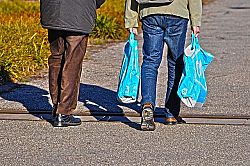

Campaigners say plastic "bags for life" should be banned or raised in price, as new figures reveal a surge in the bags is fuelling a rise in the plastic packaging footprint of leading supermarkets.
According to research from the Environmental Investigation Agency (EIA) and Greenpeace, despite promises by leading supermarkets to tackle the amount of plastic waste they create, their plastic footprint continues to rise.
In 2018, supermarkets put an estimated 903,000 tonnes of plastic packaging onto the market, an increase of 17,000 tonnes on the 2017 footprint. The Report said seven out of the top 10 supermarkets increased their plastic footprint year-on-year. Only Waitrose, Tesco and Sainsbury's achieved reductions, and those were marginal.
The surge is fuelled in part by a huge rise in the sale of "bags for life" by 26%, to 1.5 billion or 54 bags per household. The Report is calling for a ban on bags for life, or a rise in price to at least 70p, to cut the plastic mountain which is fuelling pollution.
Juliet Phillips, an ocean campaigner at EIA, said "it's shocking to see that despite unprecedented awareness of the pollution crisis, the amount of single-use plastic used by the UK's biggest supermarkets has actually increased in the past year".
“Grocery retailers need to tighten up targets to drive real reductions in single-use packaging and items. We need to address our throwaway culture at root through systems change, not materials change – substituting one single-use material for another is not the solution".
The rise in the sale of "bags for life" suggests some consumers are simply switching from single-use plastic bags, many of which have been removed from stores, to the thicker bags, which contain far more plastic weight and are therefore of particular concern. Iceland's sale of such bags rose tenfold in the past 12 months, and Tesco increased its sales from 430 million to 713 million.
The Report said "the impact of this simple substitution is a major concern, given the significantly higher plastic content of bags for life".
For more information on this subject, see: